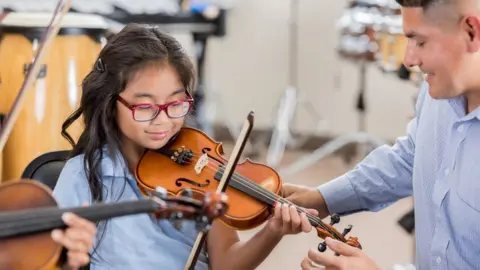All school music lessons 'should be free', MSPs say
 Getty Images
Getty ImagesMusic tuition should be provided free of charge in schools, Holyrood's education committee has recommended.
Some councils still give pupils individual lessons for free, but others have introduced charges of up to £524.
MSPs said they "respect the democratic right of local authorities to take decisions about local expenditure and acknowledge the choices they face".
But they said that "in principle, music tuition should be provided free of charge in every local authority".
They also backed the approach proposed by council umbrella body Cosla, which wants all children who are entitled to free school meals to be fully exempt from fees.
Councils including Edinburgh, Glasgow, Orkney and Renfrewshire still provide free music lessons for pupils.
But many others charge three-figure fees per pupil, per instrument, and have been increasing fees in recent years.
Figures from Improvement Service Scotland show that schools in Clackmannanshire charged the most in 2018-19, at £524 - more than double the £258.50 the previous year.
The rise in fees has coincided with the number of children taking lessons dropping - from 61,615 in 2016/17 to 60,326 in 2017/18 - as well as a drop in the number of tutors.
One council, West Lothian, reported seeing nearly 70% of pupils drop out of music lessons after a £354 charge was introduced - something the committee described as "alarming".
Councillor David Dodds told the MSPs that the council had been forced to cut funding after facing "huge problems due to the underfunding of local government".
He argued for the overall funding of local authorities to be increased, saying: "If you ring-fence music tuition and say that a sum of money will be set aside for instrumental tuition without there being a general increase in funding, you will actually be taking money away from another area."
The Scottish government has insisted that local government has been treated fairly in recent budget allocations, pointing out that some of Scotland's largest councils still provide free music lessons.
Education Secretary John Swinney said: "Choices are being made, but it is important that we do not simply say that the answer is for the government to provide more resources to local government in general, because some local authorities are attaching a greater priority to the service than others are."
'Increasingly unaffordable'
The committee said councils had a "democratic right" to make their own choices about how money was spent locally.
But convener Clare Adamson said "far too many young people" were missing out on the opportunities afforded by music lessons due to "increasingly unaffordable fees".
She said: "We recognise that in many local authorities, charging for music tuition is a reality and a decision which will not have been made lightly. This does not mean there is nothing to be done.
"Local authorities must work harder to make sure that those who can afford it the least do not lose out the most.
"This is why we have recommended that the funding for these services is re-examined and that more is done to extend concessions and discounts where possible."
Cosla said there was a "very strong consensus that instrumental music tuition is a valued service that has an important role in education", adding that it was "crucial" to maintain it even in "difficult financial circumstances".
However, the group stressed that decisions about how to spend money were "the embodiment of local democratic processes" and should be taken locally.
Councillor Stephen McCabe told MSPs: "Cosla respects the decisions that are made by democratically-elected local councils, which are accountable to the local electorate for those decisions. It is not Cosla's role to impose a national policy on our councils."
